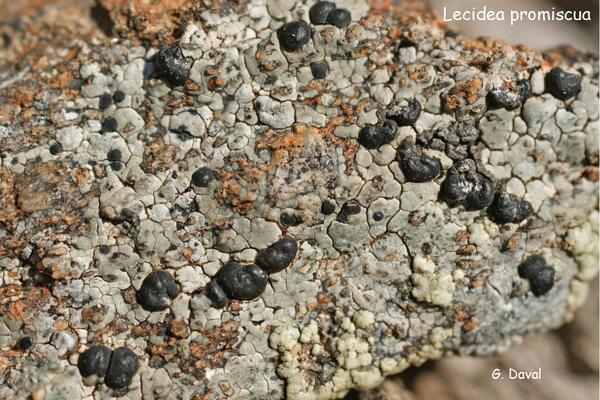Lecidea promiscua Nyl.
Flora, 57: 357, 1874.
Synonyms: Lecidea dilabens Th. Fr.; Lecidea gregalis Arnold; Lecidea speciosa Müll. Arg.
Description: Thallus crustose, episubstratic, rather thick, white to grey white, areolate, without a distinct prothallus, forming up to 10 cm wide patches. Medulla I+ intensely blue-violet. Apothecia lecideine, black, usually numerous, sessile and strongly constricted at base, rounded to angular by mutual compression, 0.5-2(-3) mm across, with a flat to convex, epruinose or slightly pruinose disc and a thin, weakly raised, persistent proper margin. Proper exciple greenish black along a thin, peripheral rim partly extending below the hypothecium, pale grey or colourless within, C-; epithecium dark green to greenish black, N+ purple; hymenium colourless of pale green in upper part, 40-55 μm high, I+ blue; paraphyses coherent, the apical cells swollen; hypothecium medium to dark brown, up to 200 μm high. Asci 8-spored, clavate, Lecidea-type. Ascospores 1-celled, hyaline, oblong or oblong-ellipsoid, (7.5)8.5-12(-13) x 3.5-5 μm, 2-3.2 times as long as wide. Pycnidia black, semi-immersed. Conidia bacilliform to filiform. Photobiont chlorococcoid. Spot tests: thallus K-, C-, KC-, P-, UV-. Chemistry: thallus with 2’-0-methylperlatolic acid (major).
Growth form: Crustose
Substrata: rocks
Photobiont: green algae other than Trentepohlia
Reproductive strategy: mainly sexual
Commonnes-rarity: (info)
Alpine belt: very rare
Subalpine belt: extremely rare
Montane belt: absent
Dry submediterranean belt: absent
Humid submediterranean belt: absent
Padanian area: absent
pH of the substrata:
1 2 3 4 5
Solar irradiation:
1 2 3 4 5
Aridity:
1 2 3 4 5
Eutrophication:
1 2 3 4 5
Poleotolerance:
0 1 2 3
Altitudinal distribution:
1 2 3 4 5 6
Rarity
absent
extremely rare
very rare
rare
rather rare
rather common
common
very common
extremely common
Loading data...
Occurrence data
Predictive map
Growth form: Crustose
Substrata: rocks
Photobiont: green algae other than Trentepohlia
Reproductive strategy: mainly sexual
Commonnes-rarity: (info)
Alpine belt: very rare
Subalpine belt: extremely rare
Montane belt: absent
Dry submediterranean belt: absent
Humid submediterranean belt: absent
Padanian area: absent
pH of the substrata:
| 1 | 2 | 3 | 4 | 5 |
Solar irradiation:
| 1 | 2 | 3 | 4 | 5 |
Aridity:
| 1 | 2 | 3 | 4 | 5 |
Eutrophication:
| 1 | 2 | 3 | 4 | 5 |
Poleotolerance:
| 0 | 1 | 2 | 3 |
Altitudinal distribution:
| 1 | 2 | 3 | 4 | 5 | 6 |
Rarity
absent
extremely rare
very rare
rare
rather rare
rather common
common
very common
extremely common
Loading data...
Occurrence data
Predictive map







